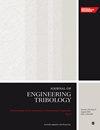6061铝合金空化试验中表面微槽的研究
IF 1.8
3区 工程技术
Q3 ENGINEERING, MECHANICAL
Proceedings of the Institution of Mechanical Engineers, Part J: Journal of Engineering Tribology
Pub Date : 2023-02-01
DOI:10.1177/13506501231153462
引用次数: 0
摘要
利用光纤激光打标设备在6061铝合金表面刻出不同宽度的微槽和不同宽度的微槽结构。为了研究微槽宽度对其空化行为的影响,利用超声振动仪对微槽结构进行了空化试验。分别用数字显微硬度计、数字三维视频显微镜和扫描电镜检测样品的硬度、表面粗糙度和显微形貌。结果表明,增大微槽尺寸有利于抑制空化侵蚀,减小微槽尺寸则相反。表面微槽组延长了铝合金在空化试验中的潜伏期,显著提高了铝合金的抗空化能力。结果表明,微沟槽群能将瞄准合金表面的微射流转化为微沟槽内部,并能吸收微射流的冲击能量,产生显著的抗空泡效果。本文章由计算机程序翻译,如有差异,请以英文原文为准。
A study on surface microgrooves in cavitation test of 6061 aluminum alloy
Microgrooves of different widths and microgrooves structures with varying widths were engraved on the surface of 6061 aluminum alloy using fiber laser marking equipment. In order to investigate the influence of the width of microgrooves on its cavitation behavior, cavitation tests on the microgroove structure were performed using an ultrasonic vibration apparatus. The hardness, the surface roughness, and the microscopic morphology of the samples were examined with a digital microhardness tester, a digital three-dimensional video microscope, and a scanning electron microscope, respectively. The results demonstrated that, increasing microgroove size was conducive to inhibition of cavitation erosion while decreasing microgroove size had an opposite effect. The surface microgrooves group elongated the incubation period of aluminum alloy in the cavitation tests, and noticeably increased the cavitation resistance of the aluminum alloy. It was also concluded that, the microgrooves group could transform microjets aiming at the alloy surface to the inside of microgrooves, and absorbed the impacted energy from microjets, leading to a remarkable anticavitation effect.
求助全文
通过发布文献求助,成功后即可免费获取论文全文。
去求助
来源期刊

CiteScore
4.20
自引率
5.00%
发文量
110
审稿时长
6.1 months
期刊介绍:
The Journal of Engineering Tribology publishes high-quality, peer-reviewed papers from academia and industry worldwide on the engineering science associated with tribology and its applications.
"I am proud to say that I have been part of the tribology research community for almost 20 years. That community has always seemed to me to be highly active, progressive, and closely knit. The conferences are well attended and are characterised by a warmth and friendliness that transcends national boundaries. I see Part J as being an important part of that community, giving us an outlet to publish and promote our scholarly activities. I very much look forward to my term of office as editor of your Journal. I hope you will continue to submit papers, help out with reviewing, and most importantly to read and talk about the work you will find there." Professor Rob Dwyer-Joyce, Sheffield University, UK
This journal is a member of the Committee on Publication Ethics (COPE).
 求助内容:
求助内容: 应助结果提醒方式:
应助结果提醒方式:


